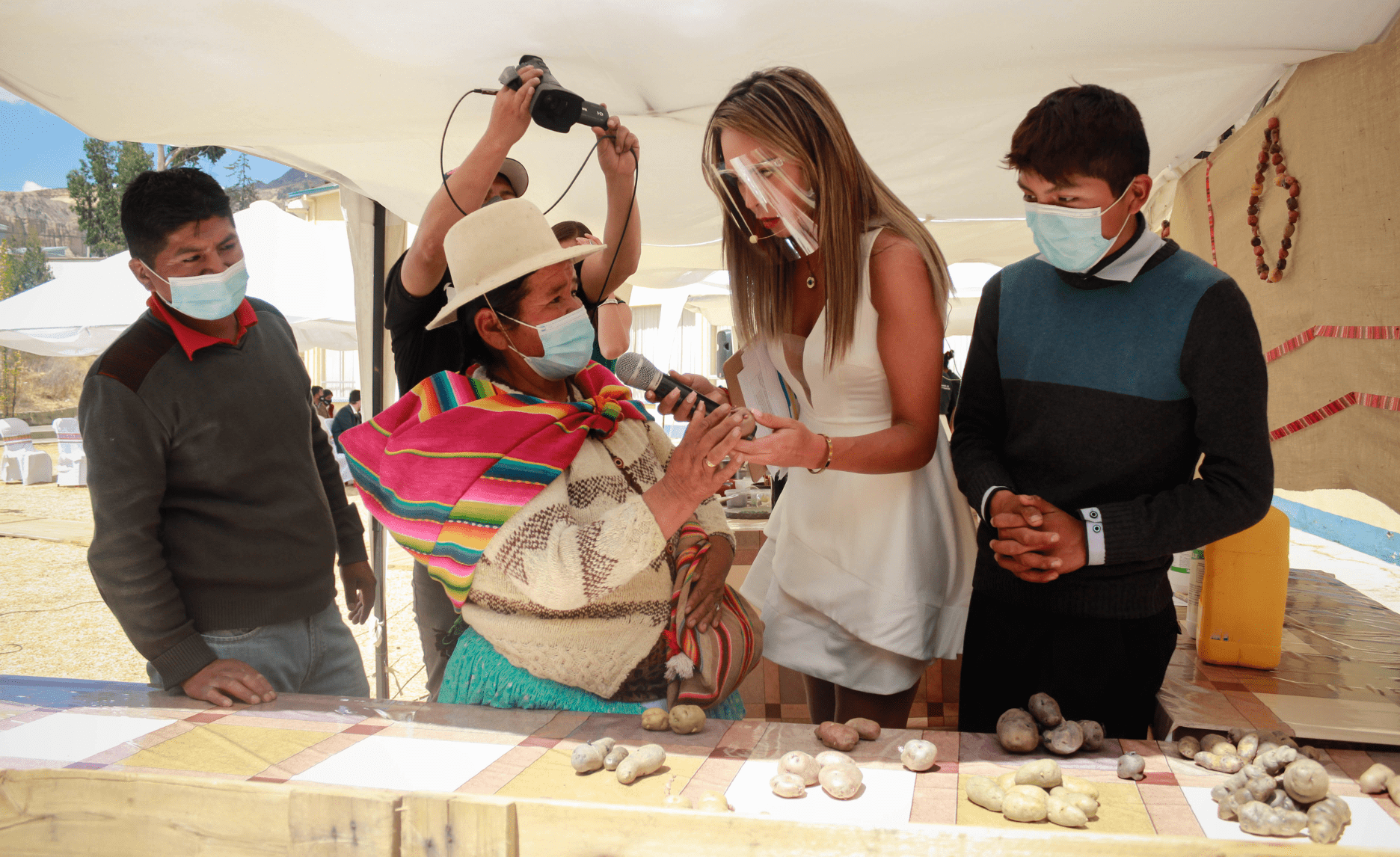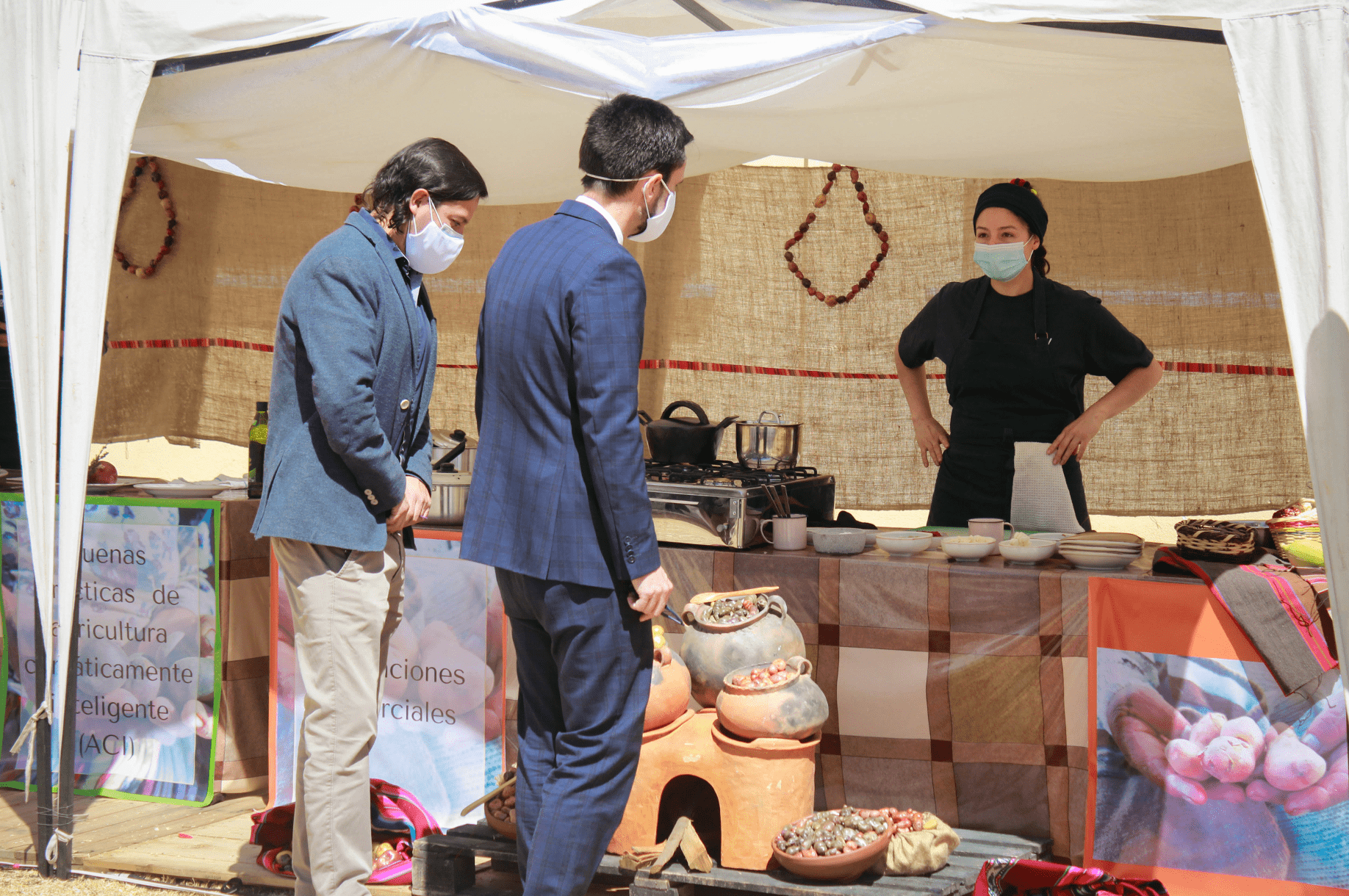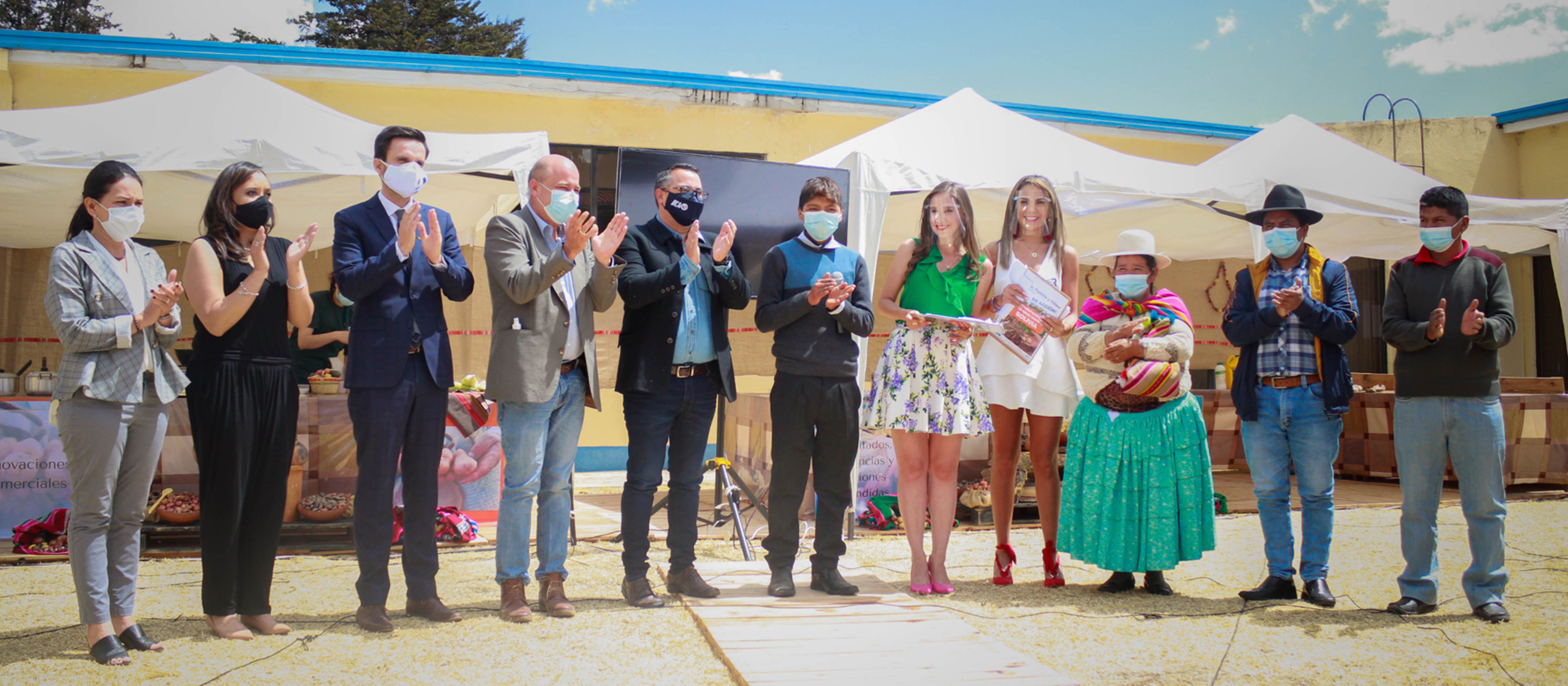La Paz, 27 August, 2021 - At an event attended by national authorities, representatives of embassies, international organisations, universities and private sector institutions and project beneficiaries,
the results of the regional project "Potato, Family and Climate" implemented in Bolivia by the International Potato Centre (CIP) and the Inter-American Institute for Cooperation on Agriculture (IICA) in the framework of the Resilient Food Production Sector of the EUROCLIMA+ Programme were presented.
The project Biodiversity and best practices of climate-smart agriculture to improve the resilience and productivity of family farming in potato-based Andean food systems (Potato, Family and Climate) has been implemented within the framework of three goals: the first related to the identification, adaptation and dissemination of best practices in climate-smart agriculture (CSA) combined with local knowledge; A second, on commercial innovations generated for linking products from potato-based Andean agri-food systems to differentiated markets; and a third, related to the systematisation and dissemination of results and lessons learned from research processes.
The results obtained in terms of applying and disseminating climate-smart agricultural practices in combination with local knowledge among potato producers' organisations in vulnerable territories in the region "are quite promising," said Emanuel Amaral, head of EU cooperation in Bolivia. "I find particularly remarkable the capacity to intervene at various points in the production chain, ensuring that the transfer of knowledge and technology to local producers is reflected in improved production with a focus on resilience and organic agriculture, and that this food can also reach end consumers in the form of quality products".
 |
Potato farmers explain what they have learned during project implementation
Álvaro Mollinedo, Bolivia's Vice-Minister of Rural Agricultural Development, highlighted the joint work being carried out by the government and organisations on behalf of producers: "We visit municipalities and producers. We work closely with IICA and CIP, we work to support our brother farmers. It is important to promote our native potatoes and give them added value and even an export seal," concluded the authority.
For his part, Santiago Vélez, representative of IICA Bolivia, said that "with the event we wanted to share the various innovations and advances that the Project has had, being aware that it is only a seed within the great challenges facing the sector".
The "Potato, Family and Climate" project has strengthened the capacities of 150 farmers from the communities of Chiarumani and Manzanani (Patacamaya), Ayzacollo and Tambo (Sica Sica) and more than 40 professionals from the agricultural sector in climate-smart practices complemented local knowledge with decision-making tools for pest control based on predictions, such as Insect Life Cycle Modelling - ILCYM), as well as on issues related to climate change adaptation and mitigation in potato-based production systems, including the estimation of the carbon footprint.
At the event, Martha Marca, Rubén Chipana and Leonel Mejía, potato producers from the municipalities of Patacamaya and Sica Sica referred to the learning process on integrated pest management, the use of bio-inputs and the use of native potato varieties.
Paola Flores, CIP's National Coordinator in Bolivia, pointed out that "to contribute to improving the resilience of family farming it is important to follow a participatory process with farmers for the analysis, selection and implementation of climate-smart practices in response to current challenges". She also stressed the importance of working in partnership with public-private actors at different levels to give continuity and sustainability to initiatives such as the project.
On the regional character of the project, Claudio Velasco, research coordinator of CIP's Latin America programme, commented that "some climate problems are common in the region, others are different and affect the different potato-growing regions of the countries in different ways. The advantage is that what is learned in Bolivia, Ecuador and Peru is shared between countries, allowing for the identification of climate-smart agriculture practices that can be used to face the new challenges facing family farming.”
With regard to goal 2 on climate-smart business innovations (AAbP-CI) of products from potato-based Andean agri-food systems for linkage to differentiated markets --, market studies were conducted on supply and demand. On this basis, 114 farmers were trained to identify the product's potential and the main challenges to reaching the market, and their capacities were strengthened on innovative business plans for differentiated products, post-harvest and marketing.
A label was also designed as a mechanism to differentiate the production of potatoes from climate-smart agricultural practices so that consumers in the market are aware of this added value.
Finally, with regard to goal 3, the objectives focused on results, evidence and lessons learned from the research and capacity building processes systematised, published and widely disseminated through the information networks of the different stakeholder groups.
"The advances in commercial matters must continue with a process that culminates in greater sales of these types of products with climate-smart practices. It is essential that every day the consumer has that information and awareness that is ultimately reflected in the sale price of this differentiated product," concluded the IICA Representative in Bolivia.
 |
Preparation of native potato dishes
The virtual platform AGRINAPSIS (Agriculture + Synapsis) has been created to disseminate best practices in climate-smart agriculture and the articulation of differentiated markets, sharing traditional and scientific knowledge, experiences, research and technological development, so that all users can strengthen the generation of answers to concerns within a community eager to learn.
Claudia Cordero, regional advisor of the Euroclima+ programme, said at the end of the event that "from GIZ, and the Resilient Food Production sector of EUROCLIMA+, we are very happy with the results achieved by the Potato, Family and Climate project and we hope that these best agricultural practices and climate-smart practices can be disseminated to promote not only higher productivity of crops such as potatoes, but also the mechanisms of coordination with the private sector to also facilitate the consumption of foods and even improve the conditions of food security and nutrition of the population".
Project Potato, Family and Climate
The "Potato, Family and Climate" project aims to improve the adaptive capacity of farmers and public and private actors linked to potato-based Andean agri-food systems in Peru, Bolivia and Ecuador, through the development, application and dissemination of best practices in climate-smart agriculture, and the articulation to differentiated markets. It is funded by the European Union through its EUROCLIMA+ Programme, Resilient Food Production Sector, implemented by GIZ and Expertise France.
Webpage of the project
Data sheet for Potato, Family and Climate
EUROCLIMA+ Green Solutions project:
- Local technicians from the Andes strengthen their capacities through a virtual programme to link family farming to markets
- Communities of practice in the Andean region facilitate innovation in pest management based on Insect Life cycle Modelling using ILCYM 4.0
More information
Paola Flores Arze, CIP Bolivia: This email address is being protected from spambots. You need JavaScript enabled to view it.
Fernando Aramayo, IICA Bolivia:
This email address is being protected from spambots. You need JavaScript enabled to view it.
Resilient Food Production Sector: This email address is being protected from spambots. You need JavaScript enabled to view it.



